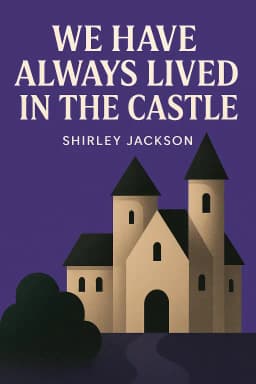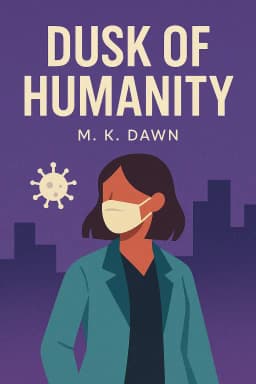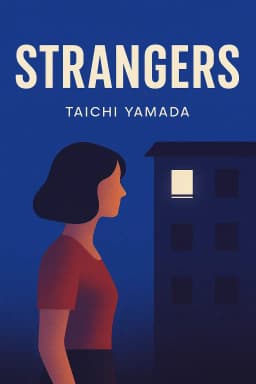
A Fortress of the Mind
Golden Hook & Introduction
SECTION
Daniel: We're often told 'home is where the heart is,' a place of safety and warmth. But what if your home is also a fortress of madness? What if the people you're protecting yourself from are the 'normal' ones, and you're the monster in the story? Sophia: Whoa, that's a chilling thought. It completely flips the script on what 'home' is supposed to mean. Suddenly it’s not a sanctuary, it’s a cage. And you're not sure which side of the bars you're on. Daniel: Exactly. And that unsettling, ambiguous space is precisely where we're living today. We're diving into what many consider a masterpiece of psychological horror, We Have Always Lived in the Castle by Shirley Jackson. Sophia: Ah, Shirley Jackson. I feel like even people who haven't read her novels know her name. She's legendary for being unsettling. Daniel: Absolutely. This was her final novel, and it’s arguably her most potent. She was already famous for her chilling short story The Lottery, which caused a massive public outcry when it was published in The New Yorker. People were cancelling their subscriptions! So she was no stranger to exploring the darkness lurking just beneath the surface of small-town America. Sophia: She clearly had a talent for poking the bear of social conformity. So, in Castle, who is living in this fortress of madness? Daniel: We're introduced to them in one of the most famous opening paragraphs in literature. Our narrator is eighteen-year-old Mary Katherine Blackwood, but she insists you call her Merricat. She lives with her older sister, Constance, and their ailing Uncle Julian. And she tells us right away what she likes—her sister, her cat, and the deadly Amanita phalloides mushroom—and what she dislikes: washing herself, dogs, and noise. Sophia: Okay, listing a death cap mushroom as one of your favorite things is a pretty big red flag right out of the gate. She sounds… peculiar. Daniel: Peculiar is a very gentle way of putting it. And the entire story is filtered through her strange, enchanting, and deeply disturbing mind.
The Fortress of the Mind: Isolation as Sanctuary and Prison
SECTION
Daniel: To understand their world, you have to understand their isolation. The Blackwoods live in a grand house on the edge of a village, but they are completely cut off. The villagers hate them. And this hatred is a living, breathing thing that Merricat has to face twice a week. Sophia: Why does she even go? If they're so hated, why not just stay locked away? Daniel: Because someone has to get the groceries and library books. Constance hasn't left the property in six years, and Uncle Julian is an invalid. So this terrifying journey falls to Merricat. And Jackson turns this simple errand into a masterclass in psychological tension. Sophia: Give me the scene. What is it like for her? Daniel: Picture this: Merricat walks into town with her shopping basket. The moment she appears, a silence falls. People stop talking. They turn and stare. She walks into the grocery store, and the other shoppers physically move away from her, creating a bubble of cold silence around her. They whisper behind their hands. She can feel their eyes on her back. Sophia: That’s awful. It’s like a middle school nightmare, but for your entire life. How does she cope with that level of constant hostility? Daniel: Through fantasy and magical thinking. As she's walking through the hostile village, she imagines herself on the moon, a place of peace and beauty where everything is perfect. And when the hostility gets too intense, her thoughts turn dark. Standing in the grocery store, surrounded by these people who despise her, she calmly thinks to herself, "I wish you were all dead." Sophia: Wow. So she's not just a victim here. There's a real darkness in her, a reactive anger. Daniel: A profound darkness. The most brutal part of her trip is when she passes a group of children. They've created a taunting nursery rhyme just for her and her sister. They dance around her, chanting, "Merricat, said Constance, would you like a cup of tea? Oh no, said Merricat, you'll poison me." Sophia: That is just cruel. And the fact that it's children doing it makes it even worse. It shows this hatred is being passed down, becoming part of the town's folklore. Daniel: Exactly. So for Merricat, the path back home, through the locked gate and onto their private land, is a return to safety. The house is their fortress. It’s filled with generations of Blackwood possessions, meticulously cared for by Constance. It’s a world of order, cleanliness, and ritual, a stark contrast to the ugly, hostile world of the village. Sophia: But is it really a sanctuary? It sounds like this isolation is also what’s feeding her paranoia and these dark fantasies. The fortress protects her, but it also seems to be warping her. It's like an echo chamber for their own trauma. Daniel: That's the central paradox of the book. The castle is their sanctuary, but it's also a prison. They are safe inside, but their perception of reality becomes more and more distorted. They've created a world with only two categories: "us" and "them." And "them" is the entire rest of the world. Sophia: And when you live like that, any intrusion, any crack in the fortress wall, would feel like an existential threat. Daniel: Precisely. And that's exactly what happens next. The outside world decides to pay a visit.
The Ghost of the Past: Trauma, Memory, and Unreliable Narration
SECTION
Daniel: The reason for all this hatred, the source of the nursery rhyme, is a family tragedy that happened six years earlier. One night at dinner, the sugar bowl was poisoned with arsenic. Merricat's parents, her brother, and her aunt all died. Sophia: My god. And who survived? Daniel: Merricat, who was sent to her room without dinner as a punishment. Constance, who cooked the meal but never ate sugar. And Uncle Julian, who was poisoned but survived, though he was left a frail, wheelchair-bound invalid. Sophia: So suspicion immediately fell on Constance. Daniel: It did. She was arrested and put on trial. And while she was eventually acquitted, the villagers never accepted it. In their minds, she will always be the poisoner. This is the ghost that haunts the castle. Sophia: And how do the survivors deal with this ghost? Daniel: In completely different ways. Uncle Julian is obsessed with it. He spends his days endlessly writing and rewriting his notes about the day of the poisoning, trying to piece together every single detail. But his memory is failing, he gets confused, he mixes up the past and present. He's trapped in a loop of his own trauma. Sophia: And Constance? Daniel: Constance refuses to talk about it. She has retreated into a world of domesticity—cooking, cleaning, gardening. She tends to the house and to Uncle Julian with a kind of serene, almost saintly patience. It’s her way of creating order out of unimaginable chaos. Sophia: And Merricat? Where does she fit in? She’s our narrator, so we should be getting the straight story from her, right? Daniel: That's the genius of Shirley Jackson. Merricat is one of the most famous unreliable narrators in literature. She protects their world not just with locked gates, but with what she believes is magic. She buries things in the garden—silver dollars, a doll, books—to create a protective barrier. She nails things to trees. She has secret "magic words" that keep them safe. Sophia: Wait, so our guide through this mystery is a teenager who believes she's casting spells to ward off evil? How are we supposed to trust anything she tells us? Daniel: We can't. And that's the point. We see everything through her warped, paranoid, and fiercely protective lens. Which becomes critical when an outsider finally breaches the walls of the castle. Their cousin, Charles Blackwood, shows up unannounced. Sophia: Let me guess, Merricat is not thrilled. Daniel: She sees him as a ghost, a demon, a threat that must be destroyed. From the moment he arrives, she is actively trying to drive him out. But to Constance, he represents something else: a link to the outside world, a chance at normalcy. Sophia: And what does Charles actually want? Is he the villain Merricat thinks he is? Daniel: It's ambiguous, but he's certainly not a hero. He immediately takes over their dead father's room, starts wearing his clothes, and shows a very keen interest in the family safe. He represents a very traditional, patriarchal force trying to impose order and take control of this strange, female-dominated household. Sophia: So he's the catalyst. He's the stone thrown into the dark, still pond of their lives. Daniel: Exactly. His presence forces the past to the surface. He wants them to forget the tragedy and move on, while Uncle Julian wants to interrogate him for details. Constance is caught in the middle, and Merricat’s protective "magic" escalates from burying trinkets to something far more destructive. She feels her world, her perfect, safe world with Constance, slipping away. Sophia: It's a brilliant narrative device. The truth of the poisoning is less important than the way the memory of it has twisted each of them into these strange, sad shapes. Memory isn't a recording; it's a story they are all telling themselves to survive. And Merricat's story is the most powerful and dangerous of all.
The Village vs. The Castle: Mob Mentality and the Outsider
SECTION
Daniel: Merricat's attempts to magically expel Charles fail. He's charming his way into Constance's good graces, and Merricat is getting desperate. She feels she's losing her sister. So, one evening, while Charles is smoking his pipe upstairs in their father's room, Merricat is sent to her room. In a fit of rage and desperation, she pushes his still-smoldering pipe into a wastebasket full of newspapers. Sophia: Oh no. She sets the house on fire. Daniel: She does. And the top floor of the house goes up in flames. Charles runs to the village for help, and soon the fire engine arrives, along with what seems like the entire town. Sophia: You'd think this would be a moment of community, of people coming together to help, even people they dislike. Daniel: You would think. And at first, they do. The firemen are trying to put out the blaze. But then, something shifts. The villagers' long-simmering resentment, their hatred and suspicion, boils over. They're in the castle now. They've breached the walls. And they see it as their chance to enact their own form of justice. Sophia: What do they do? Daniel: They start smashing things. While the fire rages upstairs, they rampage through the ground floor. They shatter Constance's precious Dresden china, they overturn tables, they stomp on the food from the pantry, they rip down the curtains. It's an explosion of senseless, collective violence. Sophia: That's horrifying. It's not about the fire anymore. It's a violation. Daniel: It's a complete desecration. And then it gets personal. They see Merricat and Constance huddled on the lawn, and they turn on them. They start shouting, mocking them. And then, they begin to chant the children's rhyme: "Merricat, said Constance, would you like a cup of tea?" Sophia: That gives me chills. They're using this childish taunt as a weapon of psychological torture. This is the most terrifying part for me. The villagers become a mob. It’s not just one or two bad people; it’s the whole town, the 'normal' people, turning into monsters. Daniel: It's a perfect depiction of mob mentality. The anonymity of the crowd gives them permission to unleash their darkest impulses. And it raises the central question of the book: who are the real monsters here? The two strange, isolated sisters in the castle, or the 'civilized' community that wants to tear them apart? Sophia: It feels so incredibly modern. You see this same dynamic play out online every day—a social media pile-on where a crowd descends on someone they've deemed an outsider or a transgressor, and the cruelty escalates because everyone feels justified by the group's anger. Daniel: Absolutely. Jackson was writing about this in 1962, but she perfectly captured the terrifying timelessness of that impulse. In the chaos, Uncle Julian dies of a heart attack. The doctor and a few other men finally manage to disperse the crowd, but the damage is done. The castle is a ruin, and the sisters flee into the woods.
Synthesis & Takeaways
SECTION
Sophia: So where does that leave them? Their house is destroyed, their last family member is dead, and their entire village has just shown its true, ugly face. It feels like the end. Daniel: It feels like it, but it's actually a new beginning. After the villagers leave, Merricat and Constance creep back to the ruins of their home. They board up the broken windows, barricade the doors, and create a new, smaller, even more isolated world for themselves in the few rooms that are still habitable. Sophia: So they retreat even further. Daniel: They do. But something has changed. The villagers, perhaps out of guilt or fear, start leaving offerings of food on their doorstep. Baskets with roasted chickens, pies, cakes. They leave them in the night, like offerings to angry gods. Sophia: So the villagers are trying to atone, but they're still too scared to actually face them. Daniel: Exactly. And the sisters take the food. They create a new routine, a new life within the ruins. And the final, chilling revelation of the book is that they are happy. Merricat turns to Constance and says, "Oh, Constance, we are so happy." Sophia: Wow. So in the end, they get what Merricat always wanted: a world with just the two of them, completely sealed off from everyone else. They won. Daniel: In a way, yes. Jackson leaves us with this profoundly unsettling idea. Maybe true safety isn't about being accepted by the world or living a 'normal' life. Maybe, for some, it's about creating your own world, your own rules, your own reality, no matter how 'mad' it seems to everyone on the outside. They have always lived in the castle, and now the ruins of that castle have become their entire universe. Sophia: It makes you wonder what 'castles' we build in our own lives to keep the world out, and at what cost. The book is so much more than a mystery; it's a deep dive into the psychology of fear, trauma, and otherness. We'd love to hear your thoughts on this. What did you find most unsettling or powerful about the story? Find us on our socials and let us know. Daniel: It’s a book that will stay with you long after you finish it. A true, haunting classic. This is Aibrary, signing off.


